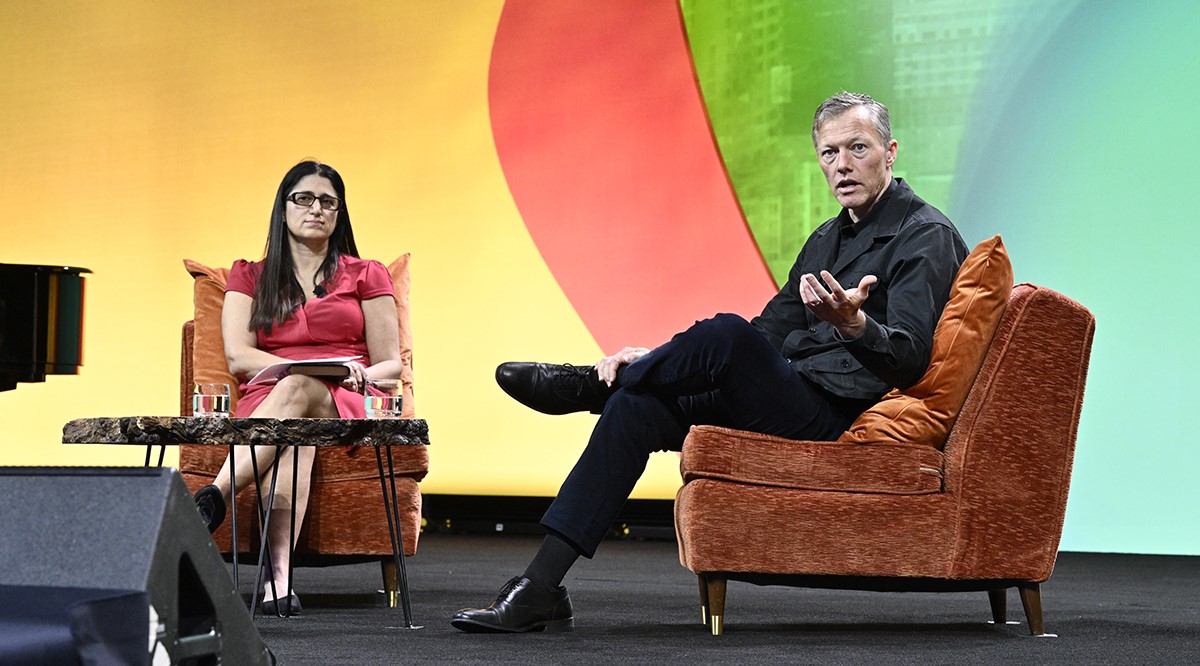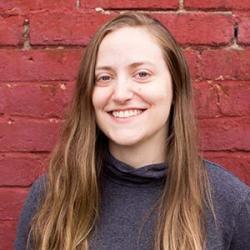
Mona Hanna-Attisha, MD, MPH, FAAP, moderates a plenary with sociologist Matthew Desmond, PhD, on ways to alleviate poverty in America at Learn Serve Lead 2023 on Monday, Nov. 6.
Credit: Kaveh Sardari
Poverty in the United States is not the unsolvable problem many people paint it as, said Matthew Desmond, PhD, a professor of sociology at Princeton University and Pulitzer Prize-winning author, during a plenary speech at Learn Serve Lead 2023: The AAMC Annual Meeting on Monday, Nov. 6.
During his talk and a subsequent conversation with moderator Mona Hanna-Attisha, MD, MPH, FAAP, C.S. Mott Endowed Professor and associate dean for Public Health at Michigan State University College of Human Medicine, Desmond outlined the broad contributors to poverty in America and the barriers to overcoming it.
As a child, Desmond experienced poverty firsthand. He saw his family home repossessed and endured the stresses and humiliations of his family’s lack of means. It raised the question that he would go on to dedicate his professional life to answering: Why is there such stark inequality in America?
The hard truth, he said, is that so many of us benefit from it.
Desmond shared a litany of statistics illustrating the growing burden of poverty and inequality in the United States:
- 1 in 3 families live in a household that has an income of $55,000 a year or less.
- 38 million people are below the federal poverty level of $30,000 for a family of four.
- Evictions have increased by 22% since the turn of the century.
- The number of public-school kids who are unhoused has increased by 74% since the turn of century.
- The amount of inflation-adjusted, non-mortgage debt has increased by more than 200% and the number of families reporting no income apart from food stamps has quadrupled since the 2008 recession.
- Since 1985, rent increases have outpaced wage growth by 325%.
- Each year, people are charged $11 billion in overdraft fees and $10 billion in payday loan fees.
“So, here's one reason there's so much poverty in America today: because the poor are exploited,” said Desmond, author of the Pulitzer Prize-winning book Evicted and his more recent work Poverty, by America. “I think it's a word we should use more.”
The exploitation is perpetuated, not only by the corporations, financial institutions, and landlords who withhold fair wages, charge exorbitant fees, and profit off those in poverty, but also by affluent Americans who benefit from the exploitation, he said.
Desmond quoted an analogy from novelist Tommy Orange, “Kids are jumping out the windows of burning buildings, falling to their deaths. And we think the problem is that they’re jumping.”
The American approach to poverty has often been to focus on those who are poor and what they can do to uplift themselves, rather than changing the systems that keep them poor. This can be uncomfortable for those whose property values are protected by segregation of affordable housing, those who have invested in the stock market and make money when exploitative corporations net profits, and those with free checking accounts that are subsidized by the poor who pay fees for their lack of capital, he explained.
The affluent also benefit from government subsidies more than the poor, he said. According to Desmond, the wealthiest families in the United States receive an average of about $35,000 annually in tax benefits, while the poorest get an average of $25,000 in subsidies. These are realized in mortgage incentives, special investment accounts, like 529 accounts that help pay for college, and other tax breaks for the wealthy.
Many affluent families further contribute to poverty by building communities that exclude and marginalize the poor — pushing them out of their neighborhoods using zoning ordinances, Desmond said.
“Democrats are more likely to support affordable housing in the abstract, but they are no more likely than Republicans to vote ‘yes’ on affordable housing in their own communities,” Desmond said. “A recent study showed that conservative renters are more likely to vote 'yes' on affordable housing plans in their own neighborhoods than liberal homeowners. Maybe we're not so polarized after all.”
Desmond called on all people to become poverty abolitionists and demand that their policymakers, hospital administrators, businesses, and other people in power divest from exploitative practices.
He acknowledged how challenging it can be for those with means to sacrifice some of their own comfort for the cause of equity, but he recommended taking small first steps. For example, rather than complaining about paying taxes, share with people in your social circle that you are donating the money you get from your mortgage deduction to a local eviction defense fund.
“I think that's how we change this conversation,” Desmond said.
Though the solution to poverty will require sacrifice, there is far more to be gained than lost, he argues.
Poverty takes a huge toll on the health of those experiencing it and places a burden on health systems, Hanna-Attisha said.
“I think it's been said that pediatricians are the ultimate witnesses to failed social policy,” said Hanna-Attisha, a pediatrician best known for her work to expose the health impact of lead in the water supply of Flint, Michigan. “And I think we can say that for so many of our medical specialties … so often in our exam rooms, we see the consequences of our inaction on addressing these big issues. I also feel as a pediatrician that I'm in the business of dreams, you know, making sure that my kids can achieve their dreams.”
Desmond agreed.
“You lift the floor by rebalancing the safety net; you empower the poor by taking on exploitation; and you turn away from segregation to invest in broad prosperity — that's how we can end poverty in America,” Desmond said. “It is hard to put into words what this would mean for the millions of kids and moms and grandpas and grandmas miles below the poverty line. It would mean a whole different existence, would mean a life marked by more fairness and security. It would mean finally being able to breathe. It would also mean a more vibrant, alive nation. How many nurses and doctors and engineers and poets and priests has poverty stolen from us?
Desmond concluded with an exhortation: “The people of the richest country in the world can and finally should put an end to it. We don’t need to outsmart this problem, we just need to hate it more.”
